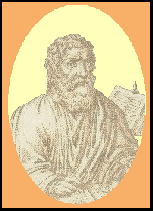Since the beginning in ancient times of India, China, Egypt, and Assyria dating as far back as the year 2700 B.C. , and in the struggle to achieve mastery over the forces of nature, people have always turned to plants for help - for food - shelter - clothing - weapons - and healing. Plants provide all these and something more: an astounding display of energy in their growth and seasonal rebirth. No wonder then, that plants have been invested with magical powers. No wonder that many myths attribute to plants an intimate relationship with our daily lives and with our destinies.

Hippocrates may be known today as the father of medicine, but for centuries pride of place in medieval Europe was given to Galen, a 2nd century physician, who wrote extensively about the four "humours" - blood, phlegm, black bile and yellow bile - and classified herbs by their essential qualities: as hot or cold, dry or damp.
These theories were later expanded by 7th century Arab physicians such as Avicenna, and today Gelenical theories continue to dominate Unani medicine, practiced by the Muslim world and India. Galen's descriptions of herbs as, for example, "hot in the the third degree" or "cold in the second" were still being used well into the 18th century.